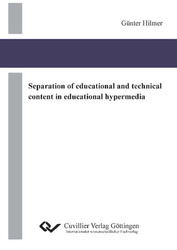| Departments | |
|---|---|
| Book Series (96) |
1381
|
| Nachhaltigkeit |
3
|
| Gesundheitswesen |
1
|
| Humanities |
2370
|
| Natural Sciences |
5408
|
| Mathematics | 229 |
| Informatics | 319 |
| Physics | 980 |
| Chemistry | 1364 |
| Geosciences | 131 |
| Human medicine | 243 |
| Stomatology | 10 |
| Veterinary medicine | 108 |
| Pharmacy | 147 |
| Biology | 835 |
| Biochemistry, molecular biology, gene technology | 121 |
| Biophysics | 25 |
| Domestic and nutritional science | 45 |
| Agricultural science | 1005 |
| Forest science | 201 |
| Horticultural science | 20 |
| Environmental research, ecology and landscape conservation | 148 |
| Engineering |
1795
|
| Common |
98
|
|
Leitlinien Unfallchirurgie
5. Auflage bestellen |
|
Advanced Search
Separation of educational and technical content in educational hypermedia (English shop)
Günther Hilmer (Author)Preview
Table of Contents, Datei (47 KB)
Extract, Datei (49 KB)
The creation and development of educational hypermedia by teachers
and educational staff is often limited by their lack of computing skills, time
and support from the educational institutions. Especially the lack of computing
skills is a hinderance to most of today’s educational experts. The
problem is to find out how those educational experts could be supported by
computer based tools which are tailored especially to their needs without
having any technical limitations.
In this study the separation of technical and educational content in educational
hypermedia is examined as a solution to this problem. The main
hypothesis of this study is that the separation of technical and educational
content is possible if it is based on a fine-grained structure of different teaching
and learning strategies and their conversion into an authoring tool. Such
an authoring tool would make the creation of educational hypermedia very
easy for teachers and therefore enable them to overcome the existing obstacles.
The development of a new model, the creation of a new XML language
and the implementation of a new authoring tool form the basis for a detailed
investigation. The investigation was done by undertaking several research
tasks like the evaluation of the XML language and the authoring tool by a
group of educational experts of different knowledge domains, the practical
usage of the authoring tool for the creation of real-life based educational
material and the analysis of the gained research results.
The analysis of the qualitative data showed that the separation of educational
and technical content in educational hypermedia is possible and that
it can be applied by educational experts with low computing skills as well
as by technical experts with no educational background. Furthermore, the
analysis allowed some additional insights into the creation of educational
material by teachers and how it can be improved.
The main conclusion of this study is that authoring tools in educational
hypermedia should use the separation of educational and technical content
based on different teaching and learning strategies which allows educational
experts with low computing skills to create educational content for delivery
via the World Wide Web.
| ISBN-13 (Printausgabe) | 3869552514 |
| ISBN-13 (Hard Copy) | 9783869552514 |
| ISBN-13 (eBook) | 9783736932517 |
| Final Book Format | A5 |
| Language | English |
| Page Number | 312 |
| Lamination of Cover | glossy |
| Edition | 1 Aufl. |
| Volume | 0 |
| Publication Place | Göttingen |
| Place of Dissertation | University of Glamorgan |
| Publication Date | 2010-02-15 |
| General Categorization | Dissertation |
| Departments |
Informatics
|








